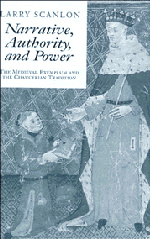Book contents
- Frontmatter
- Contents
- Acknowledgments
- INTRODUCTION: EXEMPLARITY AND AUTHORITY IN THE MIDDLE AGES
- 1 Chaucer's Parson
- 2 Redefining the exemplum: narrative, ideology, and subjectivity
- 3 Auctoritas and potestas: a model of analysis for medieval culture
- PART 1 THE LATIN TRADITION
- PART 2 THE CHAUCERIAN TRADITION
- Bibliography
- Index
3 - Auctoritas and potestas: a model of analysis for medieval culture
Published online by Cambridge University Press: 16 September 2009
- Frontmatter
- Contents
- Acknowledgments
- INTRODUCTION: EXEMPLARITY AND AUTHORITY IN THE MIDDLE AGES
- 1 Chaucer's Parson
- 2 Redefining the exemplum: narrative, ideology, and subjectivity
- 3 Auctoritas and potestas: a model of analysis for medieval culture
- PART 1 THE LATIN TRADITION
- PART 2 THE CHAUCERIAN TRADITION
- Bibliography
- Index
Summary
Authority is an important term in at least four disciplines besides literary studies: history, philosophy, political science, and sociology. Nevertheless, general discussions of the term are relatively rare. In normal usage, it generally describes a constraint handed down by a repressive past accepted compliantly by an unquestioning present. It is treated as a binary structure, which involves the simple deference of present to past. From my perspective, the problem with this view is that it ignores the problem of agency, the production and assumption of subject positions, which, as I have just argued, necessarily characterizes all systems of belief. I propose instead that we think of authority as triangulated. For it involves not just deference to the past but a claim of identification with it and a representation of that identity made by one part of the present to another. In this way the constraint of authority can also be empowering. The power to define the past is also the power to control the constraint the past exerts in the present. Authority, then, is an enabling past reproduced in the present.
There is much in classical and medieval notions of auctoritas to support this view. Jacqueline Miller, in a brief but richly suggestive discussion of medieval poetic authority, cites Abelard's famous observation that medieval writers were dwarves standing on the shoulders of the giants of classical antiquity.
- Type
- Chapter
- Information
- Narrative, Authority and PowerThe Medieval Exemplum and the Chaucerian Tradition, pp. 37 - 54Publisher: Cambridge University PressPrint publication year: 1994

